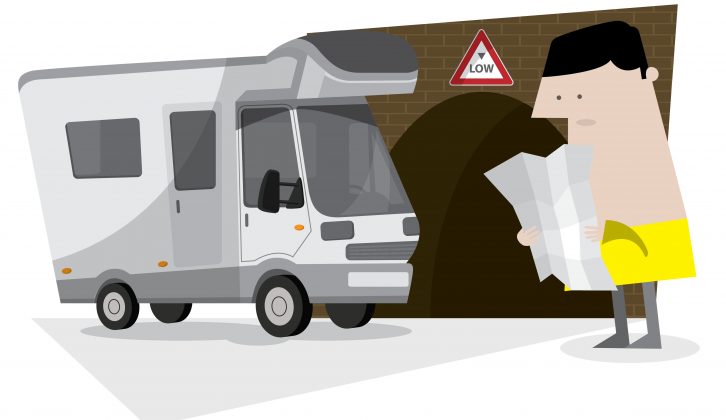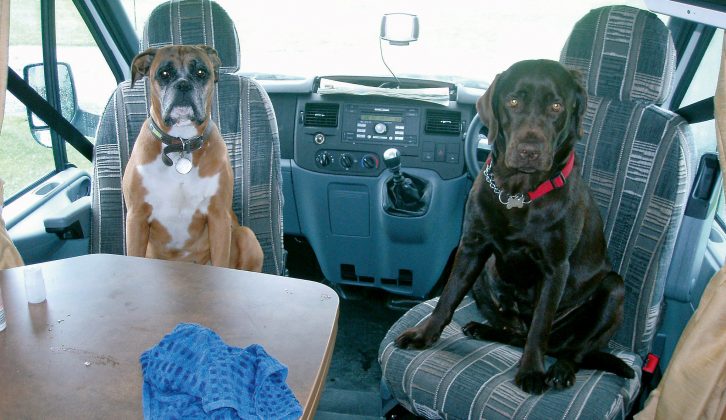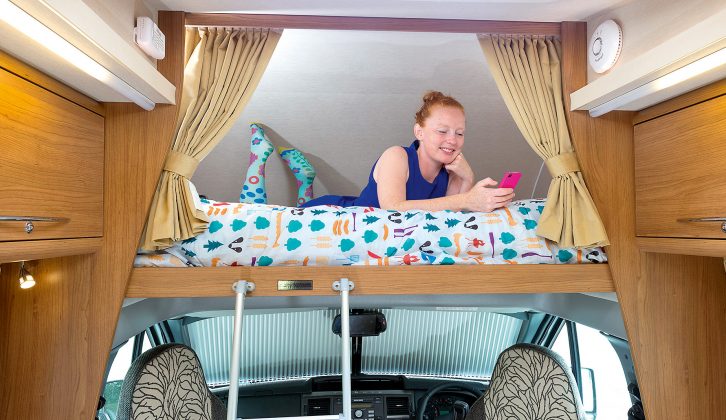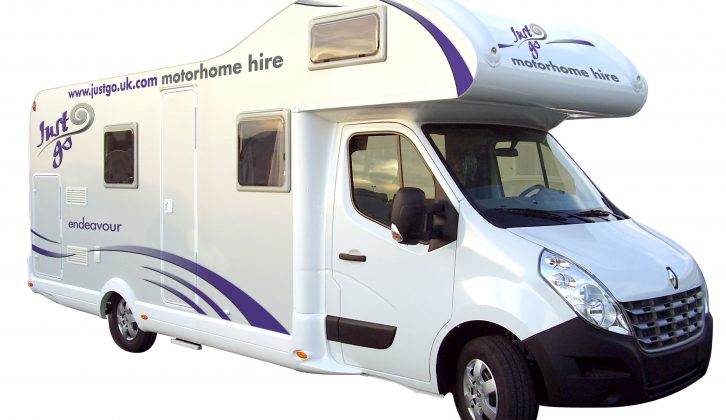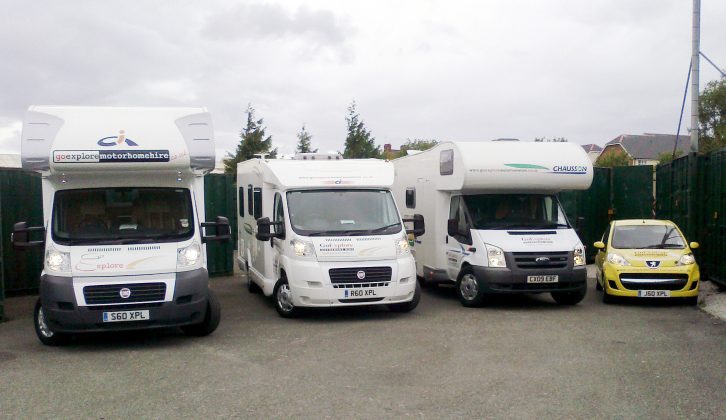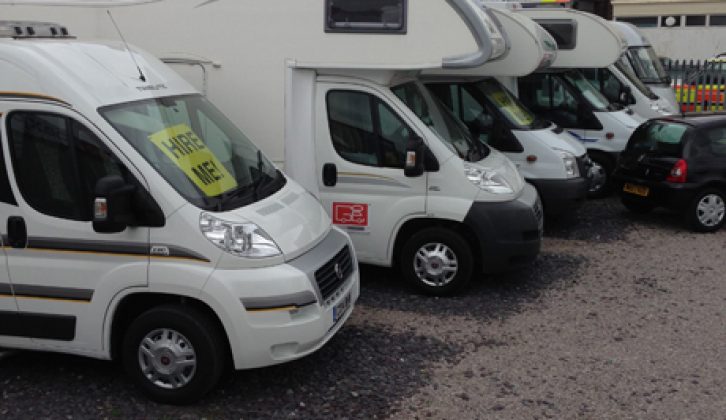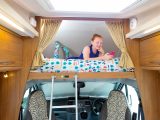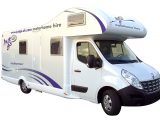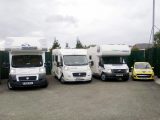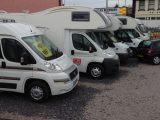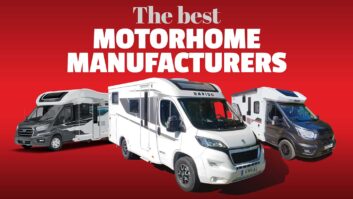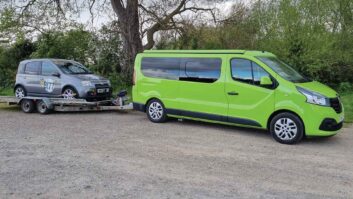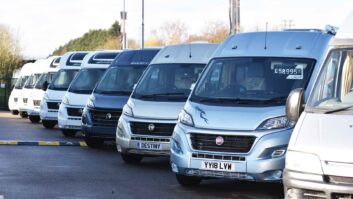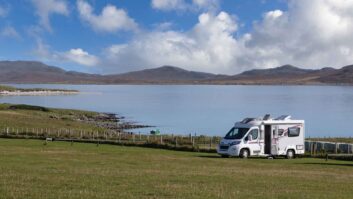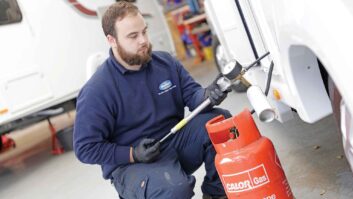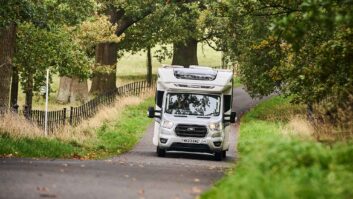Before you buy your first motorhome, why not hire one, to try out the lifestyle? Here’s our guide to UK camper hire, foreign fly-drive holidays and how to get the best deals.
Whether you’d like to use a motorhome for a week to visit a festival or other event, take an epic fly-drive tour of Australia or simply see whether a specific layout is right for you, hiring a motorhome could be the answer. But it’s not always easy to find the best deal, and there are a lot of issues to be aware of.
Here, we outline what you need to know before committing to a deal, highlight how to cope with any problems you might encounter on the road, and give advice on hiring before you buy. Whether you want to rent a small camper or huge RV, don’t sign on the dotted line without reading our guide!
Choosing a motorhome to hire
There’s a huge variety of motorhomes available, from classic VW campers to large, fully equipped coachbuilts and whopping RVs. Which you should choose depends on how many people you’re planning to go on holiday with, and the size of vehicle that you’re comfortable driving.
Don’t assume that a classic camper van will be easier to drive than a coachbuilt motorhome: if the camper is an old vehicle then you might have to contend with a lack of power steering and an unforgiving gearbox. Modern coachbuilts might be fitted with air-conditioning, and the high-up driving position means that you get a better view of the road.
You’ll need a motorhome that can comfortably sleep the number of people you’re travelling with. If you’re planning a long holiday, don’t expect someone to rough it by sleeping on an ‘occasional’ single berth. You’ll also want to ensure that there’s room for you all to sit and dine comfortably. For safety, double-check that there are enough belted seats for everyone that you’re planning to tour with; no occupant should travel in a seat without a seatbelt.
While it might be tempting to go for the biggest model that you can, bear in mind that – as a rough rule of thumb – the bigger the ’van, the more you’ll have to spend on fuel. In general, motorhomes with a protruding overcab will be less fuel-efficient than low-profiles, due to wind resistance. Opting for a larger motorhome will also cost you more in the first place; two-berths tend to be a fair bit cheaper to rent than six-berths, for example.
Have a think about whether you prefer automatic or a manual gearboxes. You might find it easier to drive a motorhome with an automatic gearbox, if you’ve never driven anything this big before. However, motorhomes with automatic gearboxes are rare, so you’re likely to have to pay a premium, and lots of companies don’t have automatics on their fleets at all.
Don’t forget to think about the layout of vehicle that you’d like. Many motorcaravanners prefer a fixed bed to a bed that needs to be made up each night, but remember that fixed beds take up precious space. If time in the lounge is more important to you, opt for a motorhome with a large lounge at the front or back that makes up into a double bed.
Finally, remember that laws apply to the weight of vehicle that you’ll be able to drive. If you’ve a C1 category on your driving licence then you can drive any motorhome up to 7500kg in the UK. C1 was automatically granted to you if you passed your test prior to 1 January 1997 and you’re not yet over 70. If you passed after this time, or if you’re over 70 and haven’t renewed the category on your driving licence, you’ll be limited to ’vans that weigh no more than 3500kg.
Selecting a good rental company
There are many rental companies to choose from around the world, from big, multi-location brands to small, one-van outfits that operate from a single base. Which you go for will depend on the vehicle that you’re looking to rent, how much you want to spend, and which companies operate in the area that you’re looking to tour.
In addition, some companies are ‘brokers’ (agencies) for private individuals wishing to rent out their own ’van. There’s nothing wrong with opting for a company that doesn’t have its own fleet of vehicles, but you’ll effectively be dealing with a third party as well as the rental company, which might increase the potential for problems. However, the motorhome hire brokers are likely to have a larger selection of vehicles than many other motorhome hire companies, and cover a wider geographical area, too.
Once you’ve found a potential company to rent a camper from, use Google to check the company’s name carefully, in case there are poor reviews from their past customers. One or two negative reviews would be normal, but a succession of them – and particularly those posted over recent months – should ring warning bells.
Make sure that the company that you’re planning to rent from has a phone number and a registered address, rather than just a contact box, on its website. And although the odd rogue dealer does turn up from time to time, the overwhelming majority of rental companies are above board.
What to ask the hire firm
So, you’ve found a hire company that seems to offer what you need; now’s the time to ask questions before committing to the rental. As a start, find out whether you’ll be charged extra – or even won’t be allowed to rent – if you’re over (or under) a certain age; in many cases this is over 70, or under 25. If you’d like to add an additional driver to the rental agreement, check how much extra this will cost (if anything). This is often a worthwhile expense, as it means that another occupant is insured to drive, should the main driver be unable to continue for any reason.
Double-check the insurance level that you’re covered by under the rental agreement – your possessions will probably not be included. If you need to, take out an additional travel policy to cover yourself fully.
A good rental company will ensure that all of its motorhomes have breakdown cover. In the same vein, check that you’ll be able to make contact with someone from the company if you have any issues while you’re on the road, particularly out of office hours or at weekends. The company should be happy to provide you with this information.
Check what’s included in your rental fee. Do you need to take towels or bedding? Are toilet chemicals included? It’s often what’s not included that can really hike up the cost, so do your sums carefully. Some companies offer bike or bedding hire, which you might like to use.
Is there a mileage limit on the rental? There’s no point in choosing a cheap ’van, then finding out that you can only take it 500 miles, when you’re planning to drive the length of Britain and back. Also, are pets allowed? Some companies offer pet friendly motorhomes, for a premium.
If your dates are flexible, find out if you could save money by picking the ’van up a day earlier or returning it sooner than you’d planned. And if you want to drop it off in a different place to where you picked it up, find out whether this will cost you more – most companies will charge a premium for this.
Check what you’ll need to bring with you to collect the ’van – this is likely to include a full driving licence (we’d take both the photocard licence and the paper counterpart for each driver, even though the paper counterpart is being abolished) and further forms of identification. Some companies might want to see travel insurance documentation, too.
Finally – and perhaps the most important piece of information of all – do read every word of the contract before signing on the dotted line. If you’re unsure or unhappy about anything, speak to the rental company before driving off in their motorcaravan.
Picking up the hired motorhome
When you arrive at the depot to collect your ’van, ask the rental company to show you how to operate all of its functions and facilities. Don’t be afraid to ask any questions, even if you think they’re silly – the rental company will have heard them before. And don’t be too embarrassed to make a few notes; there will be a lot of information to take in.
Double-check that you know where to find the following before you leave, and how to use them:
- Fuse box.
- Gas locker (and that you’ve been supplied with a gas spanner, and you know how to use it to replace a bottle).
- The fuel-filler cap (and that you’re aware of whether the ’van takes petrol or diesel).
- The water-filler cap (be careful not to get the water and fuel caps mixed up).
- The waste-water tap.
- The fire extinguisher and smoke alarm (ideally there’ll be a carbon monoxide detector, too).
- The fresh-water tap (particularly if you’re touring during the winter, as you might need to drain down the water tank in case it freezes).
- The toilet-cassette hatch.
- The electric hook-up point.
- The motorhome’s control panel, and that you know how it all works.
As with any rental vehicle, be sure to check it over for damage thoroughly before you set off. Ensure that the company has made a note of any issues, either inside or out, to cover yourself against potential issues when returning the ’van.
Ask how much fuel you’re expected to bring the vehicle back with. This varies from company to company, but some charge you for the fuel plus a penalty charge if you return with the fuel tank empty.
On the road – tips for newbies
If you’re not used to driving and staying in a motorhome, book a campsite close to the hire firm for the first night. That will give you the opportunity to find out how everything works, and make sure you’re happy with driving the motorhome before you head further afield.
It’s a sensible idea to book campsites all the way if you’re travelling during the high season – you don’t want to turn up at a site after driving a long way only to find that it’s completely full up.
Remember that wild camping – pitching overnight somewhere that’s not a designated campsite – is illegal in England and Wales. Even if wild camping is permitted where you’re planning to tour, you should always obey local laws and look for relevant signs. As always, leave no trace of your stay and always use campsite facilities or a dedicated point to dispose of your chemical waste and grey water.
Finally, if something serious goes wrong with the motorhome, or you’re involved in an accident, contact the hire company immediately for advice.
Returning your hired motorhome on time
Make sure that you have emptied the waste water and toilet tanks, or you could be charged extra. Check your contract for any other requirements on returning the motorhome. Don’t deliver it late, or you could be charged a hefty premium – check what time it’s due back, and what time the depot closes its doors.
Fly-drive RV holidays
Fly-drive motorhome holidays are extremely popular, particularly to far-flung destinations such as the US, Australia and New Zealand. You can rent a motorhome just about anywhere in the world.
Before selecting a company to rent from abroad, you should follow the same advice as if you were renting a ’van in the UK. Take extra care to look for negative reviews or bad press online, and perhaps consider posting on local motorhome internet forums to ask other people for advice.
A good rental company should supply you with everything that you legally need to carry in the specific country. For example, in Continental Europe you’re advised to carry a warning triangle, high vis jackets for each passenger, two breathalyser kits and more. The AA has general advice on driving abroad. Take a list of what’s required, and make sure that you’re fully equipped before you go.
If you’re flying to a long-haul destination, consider staying in a hotel for the first night or two, so that you’re rested when you pick up the ’van. Check the driving licence requirements – do you need an international driving licence, or will your British one suffice? If you still have one of the old-style paper licences, you might want to exchange it for a new photocard licence before you go; some rental agencies abroad are reluctant to accept the older paper licences alone. You can order an upgrade quickly online and the DVLA will now even use your passport photo to update your driving licence to save you having to have another photo taken and verified.
If you’d prefer to allow another company to take the strain for you, Camping & Caravanning Club members can take advice of the Club’s Carefree travel service; it allows you to take an escorted tour in a rental ’van to many exotic destinations. For more information, see Travel abroad with the Club.
Try before you buy
If you’re thinking of buying a motorhome for the first time, hiring a ’van for a few days or more beforehand is a great idea – it allows you to sample different layouts and sizes of vehicle without needing to commit yourself long-term. Plus, if you borrow a motorhome in the winter you’ll be able to find out how the heating system measures up, and you’ll soon discover if any other niggles present themselves.
Some motorhome dealerships have their own rental fleet, while others work in conjunction with local rental firms. You might even find that the cost of the rental is discounted from any camper van or motorhome that you go on to purchase from them. Even if your local motorhome sales dealership doesn’t advertise that they offer such a service, it’s always worth asking – or consider finding another motorhome dealer that does.
Renting your own campervan out
Hiring out your own motorhome when you’re not using it can be a great way of making a little cash – but it’s not without its downsides. Going through an agency is the easiest way to do so, but remember that it will take a cut of your profits. Also, your vehicle will be in most demand during the summer, which is when you’re likely to want to use it yourself – and you should expect that your ’van won’t be treated with the same amount of care as you would afford it.
Before committing to any rental company do your research thoroughly; if possible, get a word-of-mouth recommendation from someone who has already hired out their ’van.
Here are some rental companies to try:
- The Motorhome Holiday Company (01172 909 000) in Bristol. A new motorhome hire firm associated with the Family Travel Centre, offering VW campervan conversions and Adria motorhomes.
- Freedhome Motorhome Hire (01617 255 417) in Bury, Greater Manchester. Freedhome’s 11 vehicles range from little VW campers to big Bürstner A-classes, and there’s a pet-friendly six-berth.
- Abacus Motorhome Hire (01264 319 990) in Andover, Hampshire. Choose from nine motorhomes, each with an awning and a TV/DVD; a welcome pack is also included. Pet-friendly ’vans are available.
- Just Go UK Motorhome Hire (01582 842 888) in Flamstead, Hertfordshire. Just Go is also an agent for Apollo for ’van hire in Australia and New Zealand and can also arrange RV hire in the US and Europe.Just Go UK has seven vehicles on its fleet; all are coachbuilts. Rental costs start from £50 per day; extras such as linen sets, bike hire and sat-nav units can also be added.
- Go Explore Motorhome Hire (01492 583 913) in Conwy, North Wales. This family firm offers a fleet of five motorhomes to hire: a trio of CI Cariocas and a pair of Chausson Flash 03s. Rental fee includes outdoor chairs, atlas, site guides, crockery and more.
- The Motorhome Xperts (0844 910 3271) has motorhomes to rent in USA, Canada, Australia, New ZealandThe Motorhome Xperts is a UK-based agency for rental companies in North America, Australia and Zealand.
- West Country Motorhomes (01278 761 200) is in Highbridge, Somerset. This motorhome dealership also has four rental vehicles. If you buy a motorhome from West Country within 12 months of your hire, the cost (up to two weeks’ rental, excluding VAT) is refunded.
- Motorhome Group (0845 017 7471) is a UK-wide company, with almost 500 motorhomes on its books plus its own fleets, in Newark and Henley. Hire fees are based on the motorhome’s retail value. Vehicles come with pots, pans and crockery, but bedding and towel hire costs extra.
- Scamperholidays (01792 202 325) is a VW campervan hire company in Swansea. There are three classic T25s to choose from: the very cute Binky, Boris and Beryl. Bedding and towels are included in the rental fee.
Don’t sign on the dotted line without reading our guide!
